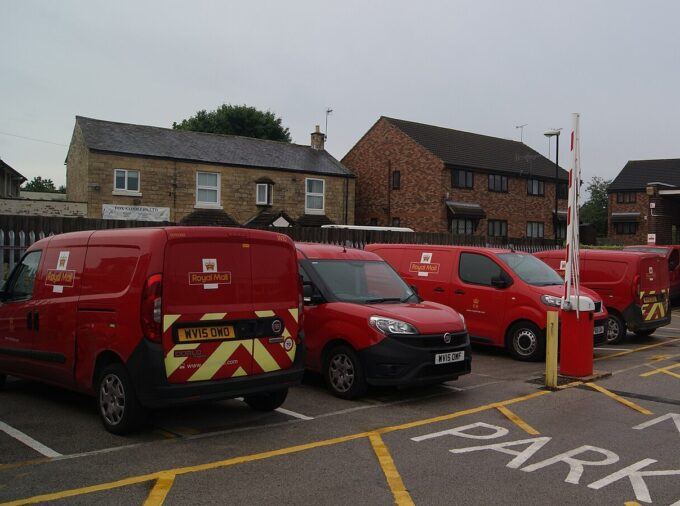

Photograph Source: Mtaylor848 – CC BY-SA 4.0
The weather was desultory as I walked from Wimbledon Station to the Communication Workers Union headquarters at 150 The Broadway. I was supposed to be filming a conflict in East Africa, but my visa still hadn’t materialised. I was trying to recall that line from Thoreau: “You must live in the present, launch yourself on every wave, find your eternity in each moment.”
The CWU represents workers across Royal Mail Group, the Post Office, BT Group, Openreach, EE, and other communication and logistics firms—its largest contingent being the 110,000 to 115,000 postal workers at Royal Mail. I had already written about their ongoing dispute with Royal Mail for CounterPunch and the New Statesman, but I had never been inside the union’s headquarters. A few weeks earlier, I had even filmed the building’s exterior as part of a film test, imagining it as a kind of fortress.
Entering it felt like something new again. A 20th-century red-brick structure bought by the union in 1997, it is now back on the market. As I stepped into reception, I found the place exactly as I imagined a union headquarters: open enough to outsiders, protective of its own. The public often criticises Royal Mail as inefficient, yet when asked about their “postie”—the postmen or postwomen who make up most CWU membership—they always speak with affection.
In May 2024, “Czech Sphinx” Daniel Křetínský’s EP Group agreed to acquire International Distribution Services PLC (parent of Royal Mail) valuing it at £3.6 billion, or £5.3 billion, including debt. This followed a lengthy national-security clearance process, and granted protections for the brand, UK headquarters, and the Universal Service Obligation (USO).
Today, industrial relations for the union are described as “cautiously constructive.” Even so, there is a difficult standstill. In December, the CWU and EP Group signed the initial agreement, but it was followed by a fuller deal in July 2025 titled “Rebuilding Royal Mail.” The success of this reset remains unclear.
The union told me it was having to keep alert over Royal Mail management commitments. Despite attempts to rebuild trust, tensions are unmistakable. I wouldn’t say the mood was confrontational, so much as measured and vigilant.
Royal Mail claims that reforming the USO and overhauling its operations could save up to £300 million annually—a modelling the CWU disputes, especially given the poor results in pilot sites. Long-promised backdated bonuses were frozen in the summer over this, which some viewed as the union holding management to account, but which others saw as gambling with members’ livelihoods.
The CWU’s stance appears firm: no reforms without clear improvements to pay, terms, and job security. For now, further roll-out is suspended.
During my visit, staff were preparing to launch a digital platform allowing members to contact MPs directly. “We collectively need to expose what has been happening in Royal Mail,” the message would later read, citing the failed pilots and the need to equalise new entrants’ terms. Whether every employee supports the union or not, engagement with this campaign was high.
Traditionally anti-union, the Telegraph framed the launch over the weekend as “Royal Mail union turns on billionaire Czech owner,” though it did note a spokesman for Křetínský’s group saying they were optimistic about ongoing talks. Even so, a surprising number of readers complained in the comments section that the paper was over-blaming the union.
By demanding transparency around how savings are calculated and distributed, the union sees proposed operational changes as being potentially harmful. Importantly, the projected savings underpin EP Group’s justification for its takeover and restructuring, and their own credibility is now under scrutiny. The CWU are prepared to challenge management directly.
One union member put it more bluntly, saying that if EP Group does nothing about the current gridlock, “they need to be asked what they’re even here for.” Workers are still reeling from the effects of the 2022–2023 industrial action, which involved 115,000 striking postal workers. If matters remain unresolved after Christmas, in other words, the risk of renewed strikes becomes real.
In such a scenario, the CWU would have to rely on understanding Křetínský—a sophisticated global operator whose ventures have ranged from Russian energy interests, to only last week a multibillion-pound stake in French oil giant Total. Many believe EP Group could absorb costs elsewhere if needed. For now, though, the CWU remains on a reasonably non-confrontational path with him, consistent with defending workers seen as a national institution.
When the Queen died, both the RMT and CWU suspended strikes. The RMT faced criticism; the CWU did not. Some suggest this reflects pride in its royal traditions as an institution. Certainly, many postal workers treasure stamps featuring King Charles III.
A more contentious issue is the company’s decision to replace the annual gift of first-class stamps with second-class ones. Even if framed as a response to USO adjustments and cost control, it comes across as petty—and many workers feel it sends the wrong signal regarding how they are valued.
During one conversation, Křetínský’s inner circle was described to me, not unfavourably, as “the Czechs”—a tight-knit executive group led by legal counsel Marek Spurný. It’s not an entirely UK-integrated management team, but nor is EP Group obliged to present itself as one. Still, failing to address the disputed savings risks damaging both the postal model and the group’s reputation—especially given Royal Mail’s symbolic status.
This issue reaches beyond industrial relations into the broader philosophy of public service. It is not all doom and gloom. Though much smaller in scale, Jersey Post, for example, operates a ‘Call & Check’ scheme where postal workers check on vulnerable residents during rounds—a reminder of what a unified public logistics network can provide. As Royal Mail still delivers to every UK address, CWU discussions hint at similar possibilities that could strengthen the company’s future role.
CWU influence also extends into politics. Jonathan Reynolds, long an ally in opposition, moved through senior government roles between 2024 and 2025. The union describes its relations with him as “very good.” They will soon meet the new Business Minister, Peter Kyle, and will be hoping for a better rapport than certainly the creative industry enjoyed during his tenure as Technology Minister.
In short, the CWU still views government as crucial. While the exact scale of its donations is unclear, 2022 accounts show £1.3 million spent on political donations and affiliations, including £460,700 in affiliation fees to Labour.
If Royal Mail and EP Group fail to break the deadlock by January, the union is likely to “engage Starmer” and press Labour to uphold the protections they promised during the takeover—promises set out explicitly in the Deed of Undertaking.
As I left the building, increasingly convinced I should try to make a film about the CWU if I don’t get my visa, the stakes for the CWU felt unmistakably high. I already looked forward to returning to hear what exact alternatives to management proposals exist.
As another Czech—Václav Havel—once wrote: “Hope is not prognostication. It is an orientation of the spirit.” Hope, in other words, is not predicting the future but choosing a mindset that keeps you going.
The post Where Labour, Capital, and a National Institution Still Collide appeared first on CounterPunch.org.
From CounterPunch.org via this RSS feed


